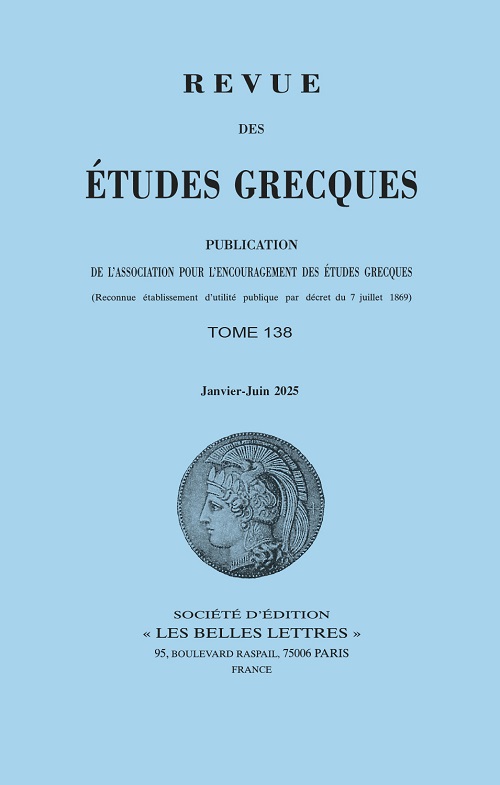 previous article in this issue previous article in this issue | next article in this issue  |

|
Document Details : Title: Les différents sens du verbe grec ἀμάω «moissonner» et l'allongement métrique de sa première syllabe Author(s): BLANC, Alain Journal: Revue des Études Grecques Volume: 138 Issue: 1 Date: 2025 Pages: 141-193 DOI: 10.2143/REG.138.1.3294248 Abstract : Depuis les néogrammairiens, on distingue deux verbes ἀμάω: l’un qui veut dire «moissonner», l’autre qui signifierait «amasser». Le premier aurait dans la langue homérique un /a/ initial long et une flexion active; le second aurait eu un /a/ bref et une flexion moyenne. Le premier serait apparenté au germanique *mēa- (< *h2meh1-) qui a donné all. mähen, angl. mow, le second se relierait à la racine du verbe lituanien semiù, sémti «puiser». En réexaminant les principales attestations du verbe ἀμάω et de ses formes à préverbe et en prenant en compte les caractéristiques de l’hexamètre dactylique et les contraintes qu’il impose, nous arrivons à la conclusion que le verbe «moissonner» et celui qui semble signifier «amasser» possédaient tous les deux un /a/ bref, et que l’/a/ long du verbe ἀμάω dans la langue épique est un allongement métrique ordinaire. En ce qui concerne le sens, nous montrons que «moissonner» a pu aboutir aux sens «amasser», «répandre» et même «déblayer». Les tablettes mycéniennes ont livré plusieurs attestations d’un substantif a-ma /amā/, qui paraît signifier «récolte». Nous proposons de reconnaître dans ἀμάω un verbe dénominatif («faire la récolte», d’où «moissonner»). En grec, comme en français, le substantif est primaire et le verbe en est dérivé: /amā/ a fourni ἀμάω, comme fr. «moisson» a fourni «moissonner». Since the neogrammarians there has been a distinction between two verbs of the form ἀμάω: one means ‘harvest’ while the other would mean ‘gather’. The first would have in Homeric language an initial long /a/ and an active inflection; the second would have had a short /a/ and a middle inflexion. The first would be related to Germanic *mēa- (< *h2meh1-), which gave German mähen and English mow; the second would be associated with the root of the Lithuanian verb semiù, sémti ‘draw’. When we reexamine the principal attestations of the verb ἀμάω and some of its forms with a preverb and take into account the characteristics of the dactylic hexameter and the constraints it imposes, we arrive at the conclusion that the verb ‘harvest’ and the one which appears to mean ‘gather’ both possess a short /a/, and that the long /a/ of the verb ἀμάω in the epic language is an ordinary metrical lengthening. As far as the meaning is concerned, we show that ‘harvest’ could result in the meanings ‘gather’, ‘spread’, and even ‘clear’. The Mycenaean tablets have provided several attestations of a substantive a-ma /amā/, which seems to mean ‘harvest’. We propose to recognize in ἀμάω a denominal verb (‘make the harvest’, whence ‘to harvest’). In Greek, as in French, the substantive is primary and the verb is derived from it: /amā/ was the basis for ἀμάω as French moisson ‘harvest’ was the basis for moissonner ‘to harvest’. |


